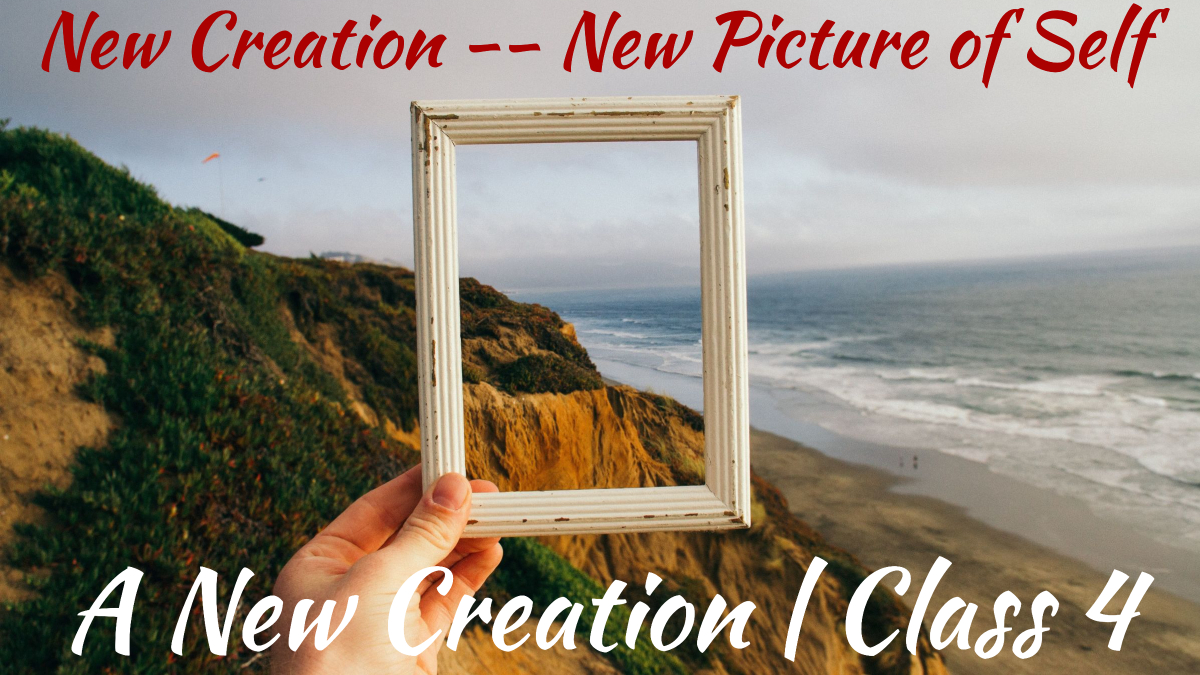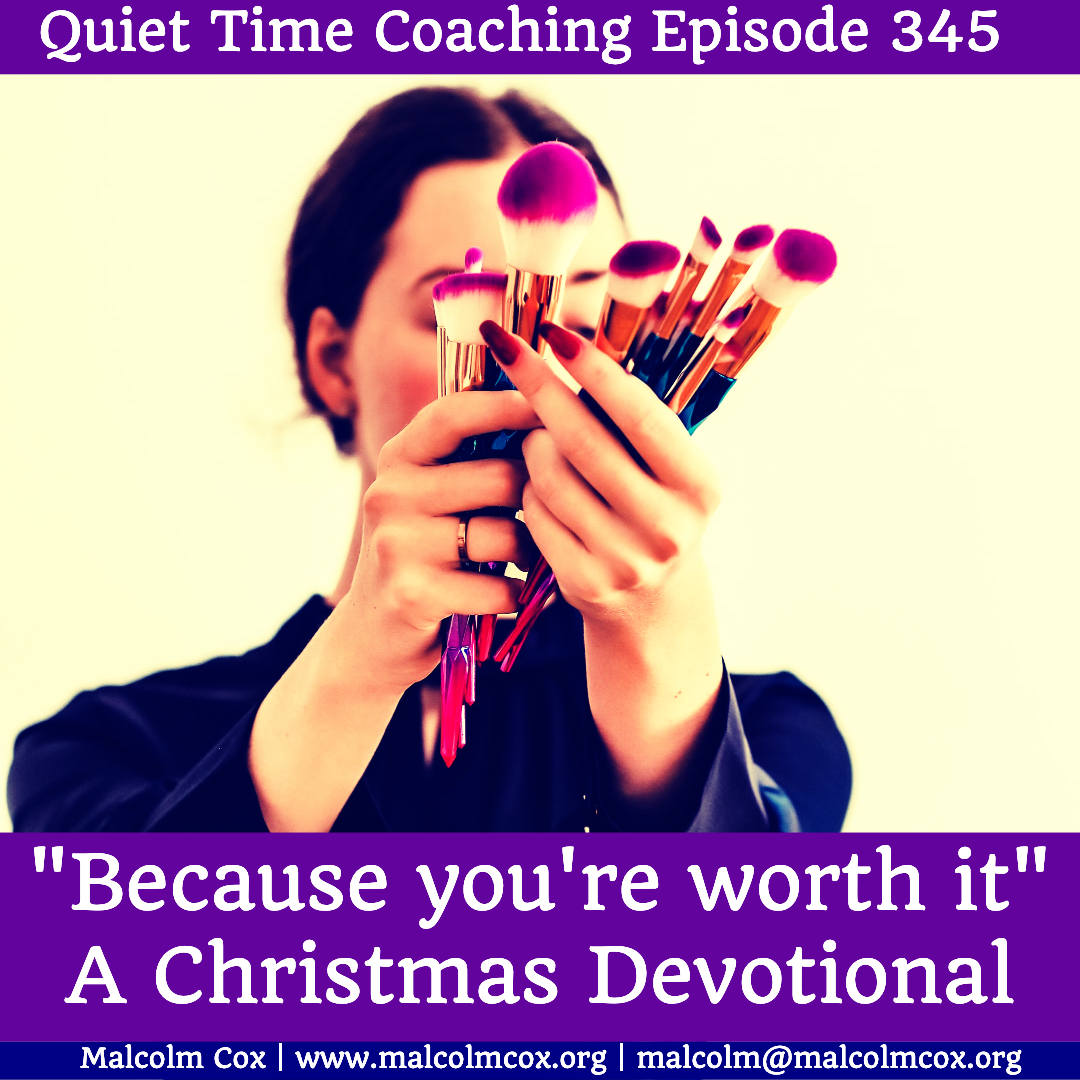
What is my picture of myself?
Introduction
- Do you like how you look? Have you ever seen yourself on video? How did you react. I’ll never forget the first time I saw myself on film. We had a preaching training session. Each of us gave a short presentation while being videoed. We received immediate feedback from the people present, but were asked to watch ourselves on the video later. I was shocked. Did I really stand like that? Was my face actually contorting in that way? Why was I staring at the floor while speaking?! It was an eye-opening experience.
- However, our inner view of ourselves matters much more than wether we have an accurate picture of our physical behaviour.
- Our picture of ourselves is shaped by our picture of God. Correcting the latter is vital before attempting to heal the former.
- Common to have unhealthy scripts in our heads – either “I’m not good enough” and/or “I’m the centre of the universe”. Most of have both, but at different times in different circumstances.
Why is my picture of myself so critical?
Christians must take this seriously because our growth into being a new creation depends on cooperating with God in his grand project to transform us into ever-increasing Christ-likeness.
2 Corinthians 3.18
“And all of us, with unveiled faces, seeing the glory of the Lord as though reflected in a mirror, are being transformed into the same image from one degree of glory to another; for this comes from the Lord, the Spirit.”
My picture of myself is both the symptom and cause of ongoing malformation. To be healthy spiritually means working for God from a place of acceptance, not for acceptance. Do we truly believe there is nothing we can do to make God love us more and there is nothing we can do to make God love us less? It is vital that we find a way to deliberately surrender our need to work to be accepted. We do this by allowing God to re-shape our picture of ourselves by contemplating what He says about us. Let’s look at some Scriptures to help us with this.
What can we say about who we are?
a. You are made in the image of God –
Genesis 1.27
“So God created humankind in his image, in the image of God he created them; male and female he created them.”
There is a distinction between the animals and us — the animals came from ‘the land’ –
Genesis 1.24-25
“Then God said, “Let the earth bring forth living creatures after their kind: cattle and creeping things and beasts of the earth after their kind”; and it was so. God made the beasts of the earth after their kind, and the cattle after their kind, and everything that creeps on the ground after its kind; and God saw that it was good.”Humanity is distinctive in that we were created directly by God. The animals come from the earth, we come from above.
God’s creative work prior to creating humans was ‘good’.
After creating humans, God said his work was very good,
Genesis 1.31
“God saw all that He had made, and behold, it was very good. And there was evening and there was morning, the sixth day.”
We are immeasurably valuable to God because we are his beloved little image bearers, and this makes a difference to who we think we are. It also changes what we think about other people and how we treat them. More on that later.
b. You are already accepted as God’s beloved
God wants to include us in His love
John 3.16
““For God so loved the world, that He gave His only begotten Son, that whoever believes in Him shall not perish, but have eternal life.”God sent Jesus because he already loved us, not so we would become lovable. We don’t always feel beloved, but God knows this and stands ready to reassure us – just like he did with Jesus.
Jesus – Mark 1.11
“and a voice came out of the heavens: “You are My beloved Son, in You I am well-pleased.””;
Matthew 17.5
“While he was still speaking, a bright cloud overshadowed them, and behold, a voice out of the cloud said, “This is My beloved Son, with whom I am well-pleased; listen to Him!””
If even Jesus needed reminder and affirmation — how about us!
We are as beloved to Jesus as he is beloved by Father God – John 15.9
“As the Father has loved me, so I have loved you; abide in my love.”
c. You are deeply ‘warped’
- “Scripture describes man as curved in upon himself to such an extent that he bends not only physical, but also spiritual goods towards himself, seeking himself in all things.” Martin Luther
- Agape love is needed for us to be in healthy relationships, but we are incapable of this without God.
- Need God to un-bend us. Can be painful, take time.
James 1.2-4
“Consider it pure joy, my brothers and sisters, whenever you face trials of many kinds, because you know that the testing of your faith produces perseverance. Let perseverance finish its work so that you may be mature and complete, not lacking anything.”
- This work of God needs to be done not so we become loveable but because he loves us and so that we can better represent him in this world.
d. I am one in whom Christ dwells and delights – John 14.23
“Jesus answered him, “Those who love me will keep my word, and my Father will love them, and we will come to them and make our home with them.”
God isn’t careless about where he lives. When he set up his home in you He did so because he loves you. Your heart is the ideal home as far as He is concerned.
Conclusion
Some suggested practices to help you piece together a more healthy picture of yourself. In other words, to see yourself as God sees you.
- Every morning, when you wake up, ask God to give you an awareness of his personal love for you. Notice what surfaces when you do this. Keep asking…
- Try repeating this phrase at points in the day: “I am one in whom Christ dwells and delights — and l.” Notice what surfaces when you do this
- Meditate on a Scripture reassuring you of God’s love such as Romans 8.38-39, “For I am convinced that neither death nor life, neither angels nor demons, neither the present nor the future, nor any powers, neither height nor depth, nor anything else in all creation, will be able to separate us from the love of God that is in Christ Jesus our Lord.”
- Study Psalm 23 and the attitude of the shepherd (God) to his sheep (you).
- Pray through Psalm 103 — a Psalm which praises God for His compassion and forgiveness. It emphasises God’s love and mercy towards those who fear Him.
Here are some questions that might prompt a fruitful discussion with your friends:
- What knocks your view of yourself off-balance? For me, it is when I am criticised.
- What has helped you develop a more accurate picture of yourself so far? Again, a picture of yourself more in line with how God views you.
- Do you have any favourite Scriptures that help you hold on to a picture of yourself as God sees you?
- Can you sense God prompting you to focus on a particular aspect of how you view yourself? If so, what is that?
- What is it about the way Jesus sees himself (the way he perceives Father God sees him) that stands out to you?
I hope you found these thoughts helpful. Drop me a line if you have any questions or feedback: malcolm@malcolmcox.org.
God bless, Malcolm
Please add your comments on this week’s topic. We learn best when we learn in community.
Do you have a question about teaching the Bible? Is it theological, technical, practical? Send me your questions or suggestions. Here’s the email: malcolm@malcolmcox.org.
If you’d like a copy of my free eBook on spiritual disciplines, “How God grows His people”, sign up at my website: http://www.malcolmcox.org.
Please pass the link on, subscribe, leave a review.
“Worship the LORD with gladness; come before him with joyful songs.” (Psalms 100:2 NIV11)

